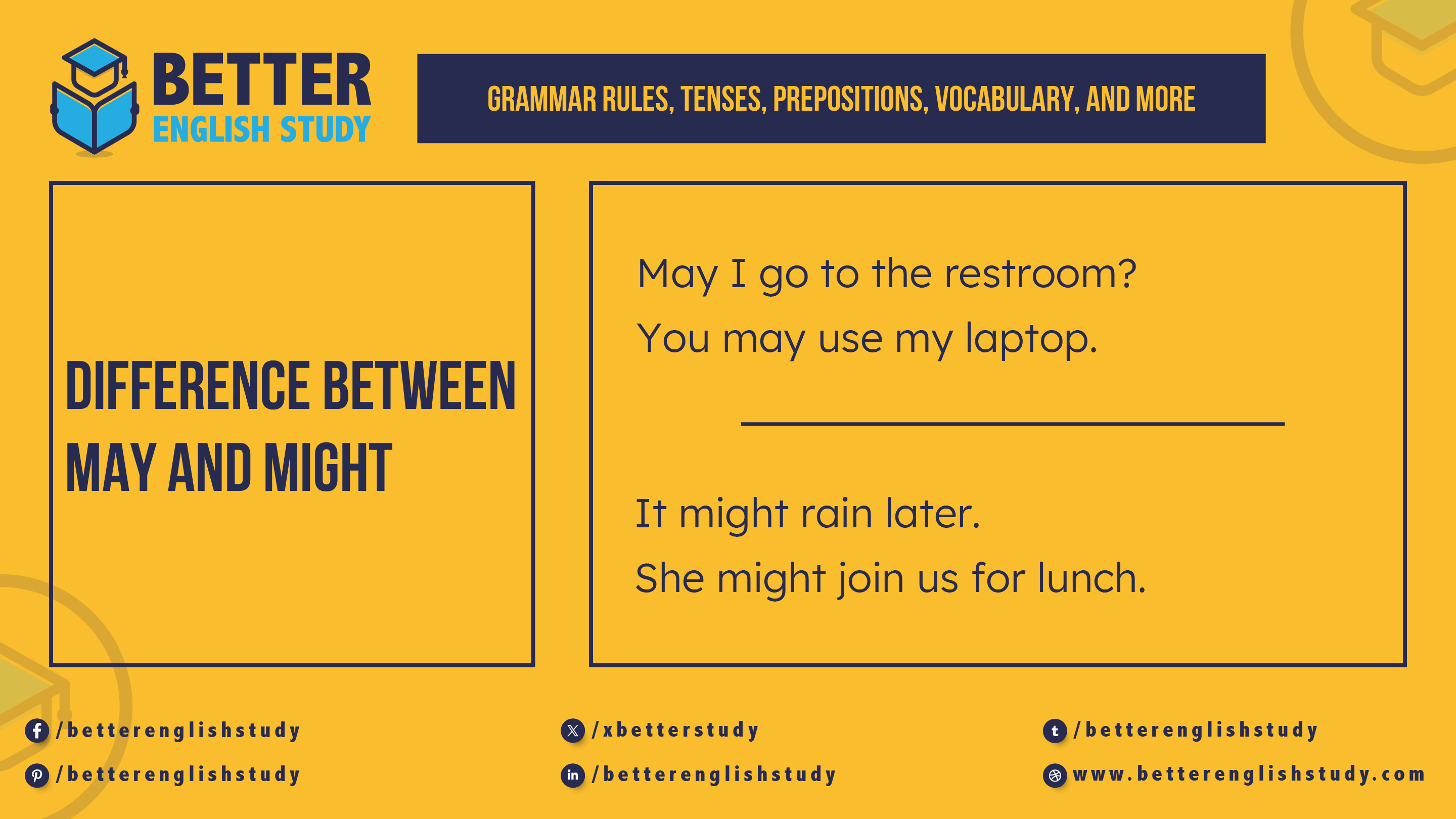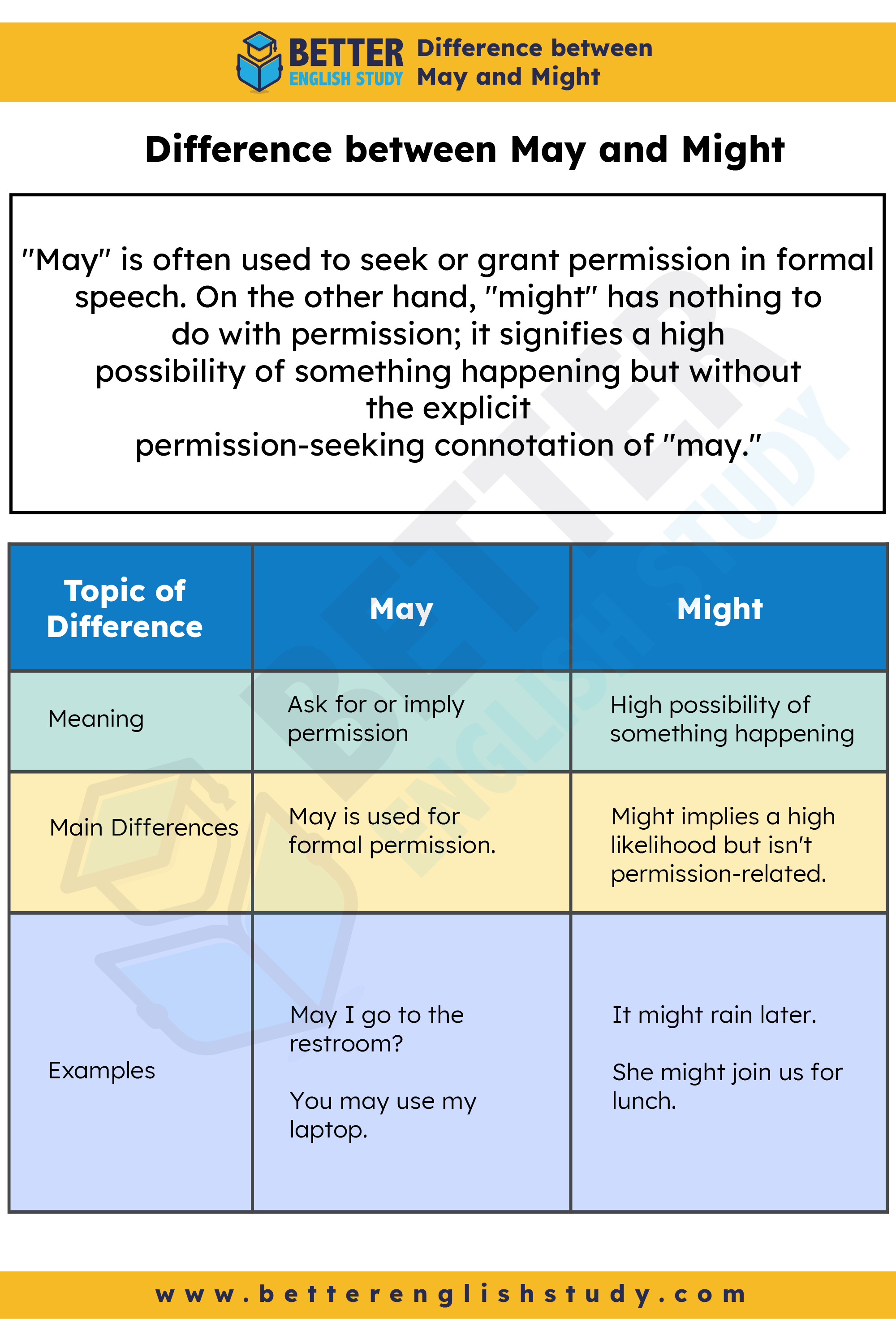
In the intricate tapestry of the English language, modal verbs like “may” and “might” often present a puzzling dilemma for language learners. Navigating their usage requires a keen understanding of their subtle nuances. Are they interchangeable, or do they wield distinct meanings? Let’s embark on a linguistic exploration to unravel the secrets behind “may” and “might” and when to appropriately employ them.
As we delve into this linguistic journey, you’ll discover that these seemingly similar modal verbs have unique roles and applications. Understanding their differences is paramount for effective communication and language mastery.
Difference between May and Might
To demystify the primary distinction between “may” and “might,” it’s essential to recognize that both modal auxiliary verbs indicate possibility or probability. However, “may” is often used to seek or grant permission in formal speech. On the other hand, “might” has nothing to do with permission; it signifies a high possibility of something happening but without the explicit permission-seeking connotation of “may.”
| Topic of Difference | May | Might |
| Meaning | Ask for or imply permission | High possibility of something happening |
| Main Differences | May is used for formal permission. | Might implies a high likelihood but isn’t permission-related. |
| Examples | May I go to the restroom?You may use my laptop. | It might rain later.She might join us for lunch. |
May or Might – When to Use
Understanding when to use “may” or “might” is crucial for clear communication. Here are scenarios where each is appropriately employed:
1. Permission
- May: May I borrow your book?
Use “may” when seeking permission formally.
- Might: Might I use your computer briefly?
Inquire with “might” for a more tentative or indirect request.
2. Probability
- May: It may rain this evening.
Utilize “may” to express a high possibility of an event occurring.
- Might: She might attend the meeting.
Use “might” to suggest a strong likelihood without explicit permission connotations.
3. Politeness and Formality
- May: May I have a moment of your time?
“May” is more formal and polite, suitable for professional settings.
- Might: Might I suggest an alternative approach?
“Might” adds a touch of formality while suggesting an idea.
Which is More Polite: Might or May?
“May” is generally considered more polite than “might.” When seeking permission or making formal requests, “may” is the preferred choice for its courtesy and formality.
Examples
- May: May I request an extension for the deadline?
In formal requests, “may” is preferred for its gracious and courteous tone.
- Might: Might I propose an alternative solution?
The use of “might” adds a layer of formality while suggesting an idea politely.
Which is Stronger: May or Might?
“May” is generally perceived as stronger than “might” when indicating possibility. “May” suggests a higher level of certainty or probability.
Examples:
- May: It may rain later today.
The use of “may” suggests a reasonable possibility without asserting a strong certainty. It leaves room for other possibilities.
- Might: It might snow tomorrow.
Similarly, “might” introduces a likelihood, but with a slightly more tentative or speculative tone. It implies a lower degree of certainty.

Can We Use Might for the Future?
Yes, “might” can indeed be used to express possibilities and likelihoods in the future. While it is commonly associated with the past tense of “may,” it is versatile and finds application in present and future scenarios.
Examples:
- She might visit us next weekend.
In this instance, “might” introduces the possibility of her visit in the future, implying a chance or likelihood without a strong assertion.
Is it “I May” or “I Might”?
Both “I may” and “I might” are correct, but the choice depends on the level of certainty or formality you wish to convey. “I may” is more assertive, while “I might” implies a higher level of tentativeness.
Examples:
- I may: I may attend the meeting tomorrow.
In this statement, the use of “may” conveys a level of certainty about the possibility of attending the meeting. It suggests a reasonable expectation.
- I might: I might join you for lunch if my schedule allows it.
Here, “might” introduces a sense of tentativeness or uncertainty. The speaker is expressing the possibility of joining for lunch, but it depends on external factors like the schedule.
Is May Formal or Informal?
“May” is generally considered more formal, especially when used to seek or grant permission in professional or polite contexts.
In conclusion, mastering the distinctions between “may” and “might” is a pivotal step in honing English language skills. These modal verbs, with their subtle variations, add depth and precision to communication, enabling learners to express possibilities, seek permissions, and convey nuanced meanings with finesse.
